Search
Academic Ethics Policy
Academic Ethics Policy

Office of Student Affairs
Johns Hopkins Carey Business School Academic Ethics Policy
Through our academic ethics policy, Carey Business School aims to reduce incidences of academic dishonesty and promote a community that acts ethically, honestly, and responsibly. In addition to Carey Business School’s ethics policy, the Johns Hopkins conduct code provides additional details about university guidelines.
PREAMBLE
The Johns Hopkins University and Carey Business School maintain a reputation for academic excellence and integrity. As members of this community, we hold ourselves to the highest standards of ethical behavior in our endeavor to create knowledge for the world. All members of our community have a personal and professional responsibility to uphold an environment of excellence, respect, integrity, and leadership in our community and in their academic endeavors at Carey and the University.
STATEMENT OF COMMITMENT
Carey Business School expects graduates to be innovative business leaders and exemplary global citizens. Carey believes that honesty, integrity, and community responsibility are qualities inherent in an exemplary citizen. The objective of the Academic Ethics Policy is to create an environment of trust and respect among all members of the Carey Business School academic community and hold students accountable to the highest standards of academic integrity and excellence.
It is the responsibility of every Carey Business School student, faculty member, and staff member to familiarize themselves with the AEP and its procedures. Failure to become acquainted with this information will not excuse any student, faculty, or staff from the responsibility to abide by this policy.
The AEP requires that each student in any course taken at Carey Business School act with honesty and integrity in all academic activities and that each student endeavor to hold his or her peers to the same standard. The AEP exists to: (1) ensure the highest level of personal and professional conduct by our students, and (2) provide a fair, deliberative, impartial, timely, and efficient process for resolving allegations of academic misconduct.
Upon witnessing an alleged violation of the AEP, a student, faculty member, or staff member must inform the responsible faculty member (if known) and the Executive Director of Student Affairs of both the alleged violation and the name of the student accused of committing the alleged violation. The report should be in writing and sent to carey.student@jhu.edu), unless circumstances are such that an immediate oral report should be made (e.g., during a quiz or final examination). If an oral report is made, it should be followed as promptly as possible with a written report. Each member of the Carey Business School community, as a person of integrity, has a personal obligation to adhere to this requirement. It is only by upholding the AEP that members of Carey Business School can contribute to the School's ability to maintain its high standards and its reputation. Students aware of a violation who fail to report it may also be found in violation of this policy. Filing of complaints of academic misconduct that the individual knows to be false is prohibited.
Violations of this AEP are viewed as a serious matter and may result in sanctions and corrective measures as described below.
Carey Business School, in collaboration with students and faculty, offers training and educational opportunities for students to learn about the AEP. Some examples include a virtual tutorial, student and faculty videos, sessions at new student orientations or during the semester, and the student AEP pledge. All students are expected to familiarize themselves with the AEP and are required to take the AEP pledge in the Student Information System. Failure to complete any training will not excuse any student from responsibility to abide by this policy.
The Academic Ethics Board and the Office of Student Affairs are available to answer any inquiries about this Policy at carey.student@jhu.edu or 410-234-9240.
SCOPE
The AEP applies to all Carey Business School students.
CROSS-DIVISIONAL ENROLLMENTS
Carey Business School students may enroll in courses in one or more other University divisions or schools. Carey students are subject to this policy not only when enrolled in Carey courses, but also when enrolled in courses in other University divisions or schools. Academic misconduct in the context of those "outside" courses will be subject to and resolved under this policy.
NON-ACADEMIC MISCONDUCT
All issues of non-academic student misconduct will be subject to the University-wide Student Conduct Code (for more on this code, please refer to http://studentaffairs.jhu.edu/policies/student-code/).
AUTHORITY
Carey Academic Ethics Board
The Carey Academic Ethics Board adjudicates alleged violations of the AEP as described below.
The Academic Ethics Board comprises Carey students and faculty, and the Executive Director of Student Affairs (or designee). The faculty representatives are appointed by the Vice Dean for faculty and research. Student representatives are selected by the Office of Student Affairs through a nomination and interview process. Those students interested in serving as student co-chairs may inform the Office of Student Affairs through this process. Students in good academic standing with no previous academic ethics violations are qualified to serve on the Academic Ethics Board. Based on a review of the pool of interested students, the Office of Student Affairs will appoint the student representatives and co-chairs for one-year terms. Student representatives may be reappointed for additional terms. The Academic Ethics Board is comprised of at least ten faculty representatives, ten student representatives, and the Executive Director of Student Affairs (or designee).
Faculty have the authority to resolve certain first-time offenses, as described below.
Carey Academic Ethics Board Panel
The Academic Ethics Board Panel is charged with determining, based on a preponderance of the evidence, whether a student’s actions constitute a violation of AEP and, if so, determining (an) appropriate sanction(s) as described below. The AEB Panel is comprised of one student co-chair, two additional students, three faculty representatives, and the Executive Director of Student Affairs (or designee). A majority vote is required for panel decisions, except that unanimity is required for a sanction of expulsion. The Executive Director of Student Affairs (or designee) does not have voting rights.
Jurisdiction
The AEB has jurisdiction over the following, without limitation:
- Violations of the Academic Ethics Policy
- Violations may include, but are not limited to, the following:
- Cheating, plagiarism, unpermitted collaboration, forgery of academic documents, facilitating academic dishonesty, unfair competition, failure to report a violation, or adhere to policies
- Improper use of intellectual property
Removal and vacancies
A faculty or student representative may be removed from the AEB or a particular panel if they have not met the expectations required of a board member. This decision will be made by the Executive Director of Student Affairs with regard to student representatives and by the Vice Dean for Faculty and Research with regard to faculty representatives. Any vacancies in student representatives, including student co-chairs, will be filled by the Executive Director of Student Affairs and any vacancies in faculty representatives will be filled by the Vice Dean for faculty and research.
ACADEMIC MISCONDUCT
Academic misconduct is prohibited by AEP. Academic misconduct is defined as any action or attempted action that may result in creating an unfair academic advantage for oneself or an unfair academic advantage or disadvantage for any other member or members of the academic community. This includes a wide variety of behaviors such as cheating, plagiarism, altering academic documents or transcripts, gaining access to materials before they are meant to be available, and helping other individual(s) to gain an unfair academic advantage. Nonexclusive examples of academic misconduct are listed below.
Cheating
- Fraud, deceit, or dishonesty in an academic assignment, text, or examination
- Use or consultation of unauthorized or inappropriate materials (e.g., notes, books, etc.) on assignments, tests, or examinations
- Unauthorized discussion of a test or examination during its administration
- Copying content on an assignment, test, or examination from another individual
- Obtaining a test or examination or the answers to a test or examination before administration of the test or examination (e.g., either an electronic copy or hard copy)
- studying from an old test or examination whose circulation is prohibited by the faculty member
- Use or consultation of unauthorized electronic devices or software (e.g., calculators, cellular phones, computers, tablets, etc.) in connection with assignments, tests, or examinations
- Use of paper writing services or paper databases
- Unauthorized collaboration with another individual on assignments, tests, or examinations
- Submission of an assignment, test, or examination for a re-grade after modifying the original content submitted
- Permitting another individual to contribute to or complete an assignment, or to contribute to or take a test or examination on the student's behalf
- Unauthorized submission of the same or substantially similar work, assignment, test, or examination (e.g., a paper, etc.) to fulfill the requirements of more than one course or different requirements within the same course
- Tampering with, disabling, or damaging equipment for testing or evaluation
Plagiarism
- Use of material produced by another person without acknowledging its source
- Submission of the same or substantially similar work of another person (e.g., an author, a classmate, etc.) without proper attribution and citation
- Dual submission of an assignment
- Use of the results of another individual's work (e.g., another individual's paper, examination, homework, computer code, lab report, etc.) while representing it as your own
- Improper documentation/acknowledgement of quotations, words, ideas, views, or paraphrased passages taken from published or unpublished sources
- Wholesale copying of passages from works of others into your homework, essay, term paper, or dissertation without acknowledgment
- Paraphrasing of another person’s characteristic or original phraseology, metaphor, or other literary devices without acknowledgment
Forgery/falsification/lying
- Falsification or fabrication of data/information for an assignment, text, or examination, or in an experiment
- Citation of nonexistent sources or creation of false information in an assignment
- Attributing to a source ideas or information that is not included in the source
- Forgery of University or other official documents (e.g., letters, transcripts, etc.)
- Impersonating a faculty or staff member
- Request for special consideration from faculty members or university officials based upon false information or deception
- Fabrication of a reason (e.g., medical emergency, etc.) for needing an extension on or for missing an assignment, test, or examination
- Claiming falsely to have completed and/or turned in an assignment, test, or examination
- Falsely reporting an academic ethics violation by another student
- Failing to identify yourself honestly in the context of an academic obligation
- Providing false or misleading information to a faculty member or any other University official
Facilitating Academic Dishonesty
- intentionally or knowingly aiding another student to commit an academic ethics violation
- allowing another student to copy from one's own assignment, test, or examination
- making available copies of course materials whose circulation is prohibited (e.g., old assignments, case studies, or examinations, etc.)
- completing an assignment or taking a test or examination for another student
- sharing paper mill/answer bank websites or information with other students
- any improper use of intellectual property (including unauthorized class recordings)
Unfair competition
- Intentionally damaging the academic efforts of another student(s)
- Stealing another student's academic materials (e.g., books, notes, assignments, etc.)
- Denying another student needed University resources (e.g., hiding library materials, stealing lab equipment, etc.)
Failing to report alleged violation
- Failing to report any known or suspected violation of the AEP
Failing to follow applicable policies, procedures, and rules
- Failing to follow applicable Johns Hopkins, divisional or school, program, course, and/or faculty policies, procedures, and rules regarding academic ethics
FACULTY-STUDENT RESOLUTION OF FIRST-TIME OFFENSES
If a student is suspected of academic misconduct, the faculty member responsible for the course in which the misconduct allegedly occurred must, if feasible, promptly review the facts of the case with the student. If the faculty member believes that academic misconduct has occurred, the faculty member must first contact the Executive Director of Student Affairs (carey.student@jhu.edu) to determine whether the offense is a first or subsequent offense. If a first offense, the faculty member may choose to resolve the case directly with the student in accordance with this section (i.e., the faculty member and student may reach an agreement on the resolution of the alleged misconduct; note that neither the faculty member nor the student is obligated to resolve a complaint under this section). A faculty member may not resolve a second or subsequent offense directly with the student. The maximum sanction that can be imposed by a faculty member in a resolution of a first offense is a zero on the assignment. The faculty member must submit all relevant information regarding any agreement reached with the student to the Executive Director of Student Affairs. If such an agreement is reached, the Office of Student Affairs will promptly provide the student with a letter outlining the resolution that includes the charges, a summary of all the evidence, the findings, and the sanctions agreed upon.
In addition, the faculty member shall notify the Executive Director of Student Affairs when:
- The faculty member cannot reach an agreement with the student (e.g., the student denies cheating or does not agree with the proposed sanction, etc.).
- The reported violation is a second or subsequent offense for the same student.
- The faculty member prefers to refer the case to the Executive Director of Student Affairs for resolution.
- In the case of a first offense, the faculty member believes that the sanction warranted is greater than zero on the assignment.
In such instances, the case will proceed to the next phase of resolution as outlined below.
HEARING
The Executive Director of Student Affairs (or designee) may dismiss a case for a lack of sufficient information or if the alleged conduct does not fall within conduct prohibited by this policy. Absent these circumstances, the case will be resolved per the proceedings described below.
First-time offenses not informally resolved between a faculty member and student – administrative hearing or academic ethics board panel hearing
In the case of a first offense that is not resolved between the faculty member and student, the Executive Director of Student Affairs (or designee) shall investigate and recommend one of two options: Administrative Hearing or Academic Ethics Board Panel Hearing. The gathering of case information may include meetings with or requests for statements from the student and witnesses and review of any related information. In making this recommendation, the Executive Director of Student Affairs shall also consider the nature of the alleged misconduct and potential sanctions, prior academic misconduct history of the student (if any), and other relevant information and factors.
Second and subsequent offenses
Second and subsequent offenses must be heard by the Academic Ethics Board. For a second or subsequent violation, as a general matter, the only sanctions that may be imposed are suspension or expulsion, provided that the AEB has the discretion to impose a lesser sanction in the rare instances when warranted by the facts and circumstances of a particular case.
Administrative hearing (for first-time offenses only)
An Administrative Hearing involves a meeting between the Executive Director of Student Affairs (or designee who serves as a hearing administrator), the reporting faculty, and the student. The reporting faculty member has the option to attend or not attend the meeting. The Executive Director of Student Affairs (or designee) may also meet with witnesses and others involved and obtain and review relevant evidence. The Executive Director of Student Affairs (or designee) will review the allegations and evidence with the student and give the respondent and the reporting faculty an opportunity to respond. The Executive Director of Student Affairs (or designee) will determine based on a preponderance of the evidence whether the student is responsible for the alleged Policy violation(s), and, if so, issue (an) appropriate sanction(s).
Academic Ethics Board Panel Hearing
The Academic Ethics Board Panel hearing is a closed proceeding, meaning that no one other than the panel members and necessary faculty and staff members may be present (along with, if applicable, the student or witnesses). The student and witnesses called to the hearing will be present in the hearing room only when making a statement or being questioned by the Panel. The student is strongly advised to be present and present his/her case. If the student does not appear for a hearing, the hearing will be conducted in his/her absence and a determination made that may result in dismissal or other sanctions.
In general, hearings will proceed as follows, although the AEB Panel has the discretion to alter the order or manner in which it hears or receives evidence, and to impose time limits on any stage of the process:
- Introductions
- Summary of reported charges
- Opening statement from the panel indicating the context, charge(s), and evidence
- Opening statement from the student
- Opening statement from the reporting faculty, if the reporting faculty member chose the option to attend the meeting
- Questioning of the student by the panel
- Questioning of the witnesses and reporting faculty, if any, by the panel
- Closing statement from the student
- Closing statement from the reporting faculty, if the reporting faculty member chose the option to attend the meeting
Witnesses
The Executive Director of Student Affairs (or designee) or the Academic Ethics Board Panel may request the presence of any witness with relevant information about a case. The student may also request the Panel to hear from witnesses with relevant information. Absent exceptional circumstances, the student should inform the Executive Director of Student Affairs (or designee) in writing at least three business days in advance of any meeting or hearing of the names of the witnesses and to what they will attest. The Executive Director of Student Affairs(or designee) or Panel may determine whether and if and the extent to which witnesses will be permitted to participate or questioned in any meeting or hearing, including whether their testimony is relevant.
GENERAL PROCEDURES
In connection with the resolution of alleged Policy violations, a student shall:
- Be notified in writing of the allegations in advance of any meeting or hearing;
- Be notified in writing of the charges, and the date, time, and location of the hearing, and the identity of the hearing administrator and members of the Academic Ethics Board who may sit on the hearing committee in advance of the hearing;
- Have the opportunity to review in advance of any meeting or hearing any relevant information to be considered by any faculty member, hearing administrator, or Panel consistent with the Family Educational Rights and Privacy Act of 1974 (FERPA), as amended, and to protect other confidential information;
- Be notified in writing of the outcome of any hearing, namely the findings, determination of responsibility, and any sanctions; and be notified in writing of the outcome of any appeal.
The student has the right to a fair and timely hearing in accordance with the AEP. A student may raise the potential conflict of interest about any University personnel or student participating in the resolution process. A student may also decline to participate in the resolution process. The School may, however, continue the process without the student's participation.
Communications under this Policy will be conducted with students primarily through their official University email address, and students are expected to check their official University email on a regular basis.
EVIDENTIARY STANDARDS
A "preponderance of the evidence" standard will be used to determine responsibility for alleged violations of this Policy. A "preponderance of the evidence" standard is an evidentiary standard that means "more likely than not." This standard is met if the proposition is more likely to be true than not true.
APPEALS
Except in the case of a resolution for first-time offenses with a faculty member, the student may appeal the hearing administrator’s or Academic Ethics Board Panel’s finding of responsibility and/or sanction(s). A student may file any appeal within five business days of the date of the notice of outcome solely on one or more of the following grounds
- Procedural error that could have materially affected the determination of responsibility or sanction(s);
- New information that was not available at the time of the hearing and that could; reasonably have affected the determination of responsibility or sanction(s); or
- Excessiveness of the sanction(s).
Any appeal must be filed in writing to the Dean through the Vice Dean for education (email or hard copy). An appeal will involve a review of the file; the appeal does not involve another hearing. The Dean may consult with appropriate University personnel and the Academic Ethics Board Panel in reviewing an appeal. On review of the appeal, the Dean may:
- Affirm the decision of the Panel;
- Enter a revised determination of responsibility and/or revise the sanction(s); or
- Remand the matter to the hearing administrator or Panel to reconsider the determination of responsibility and/or sanction(s); or
- Convene a new Panel to consider the case.
The Dean will simultaneously send the appeal determination, with the reasons therefore, to the Vice Dean for education and to the student. The decision of the Dean is final. No further appeals are permitted.
SANCTIONS
The Academic Ethics Board Panel may impose one or more sanctions (which may include one or more corrective and educational measures that the Panel deems appropriate and commensurate with the Policy violation). In doing so, the Panel may consider:
- The specific academic misconduct at issue;
- The student’s academic misconduct history; and
- Other appropriate factors.
This section lists some of the sanctions that may be imposed upon students for violations of the AEP. Carey reserves the right, in its discretion, to impose more stringent or different sanctions than those listed below depending on the facts and circumstances of a particular case. Sanctions for academic misconduct under this Policy are generally cumulative in nature.
A student found in violation of the AEP in a course may not avoid the Policy and any potential sanctions by withdrawing from a course.
The following is a non-exhaustive list of possible sanctions and what these sanctions typically mean. The specific conditions imposed under each sanction (e.g., the terms of a suspension, etc.) will depend on the specific facts and circumstances of each case:
Formal warning
The student is notified in writing that his or her actions constitute a violation of the AEP, and may be subject to other actions (e.g., re-taking an examination or failure in a course).
Academic
These sanctions may include but are not limited to grade adjustments, including failure on any work within the course or failure in the course itself, requiring extra credit to be completed, or re-submission of an assignment, or re-taking a test or examination. This may include a notation on the student’s official Carey Business School academic transcript. For example, if the sanction is an “F” for the course, “F due to Academic Dishonesty” may be permanently noted on the student’s official Carey Business School transcript.
Transcript notations
Academic misconduct may be noted on a student's academic transcript.
Corrective or educational measures
The student may, for example, be required to write and submit a reflection paper as an opportunity to learn and reflect and/or be required to engage in other corrective or educational measures.
Probation
The student is notified that further violations of the AEP within the stated period of time will result in the student being considered for immediate suspension or other appropriate disciplinary action. If at the end of the specified time period no further violations have occurred, the student is removed from probationary status.
Suspension
The student is suspended from the University for a specified period of time. The conferring of an academic degree may be deferred for the duration of the suspension. A student must request in writing and then receive written permission from the Executive Director of Student Affairs (or designee) prior to re-enrollment or re-application. Academic work completed at another institution while on suspension will not be recognized for credit transfer.
Expulsion
The student is expelled from the University. Expulsion means the permanent removal of the student from the University. Expulsion includes a forfeiture of all rights and degrees not actually conferred at the time of the expulsion, permanent notation of the expulsion on the student’s University records and academic transcript, withdrawal from all courses according to divisional policies, and the forfeiture of tuition and fees. Any student expelled from the University is prohibited future re-application to the University.
RECORDS
A case file concerning a student will be retained for the duration of the student's enrollment at Carey Business School plus seven years from the date that the student graduates or otherwise leaves the University.
Significant amendments to the AEP must be approved by the Vice Dean for faculty and research, the Vice Dean for education, the Dean, and a faculty vote (vote passing with a simple majority). Minor amendments to the AEP may be made by the vice dean for faculty and research or the Vice Dean for education with notification to the Dean.
Questions?
Ge Bai, PhD, CPA
Case Competitions
Case Competitions
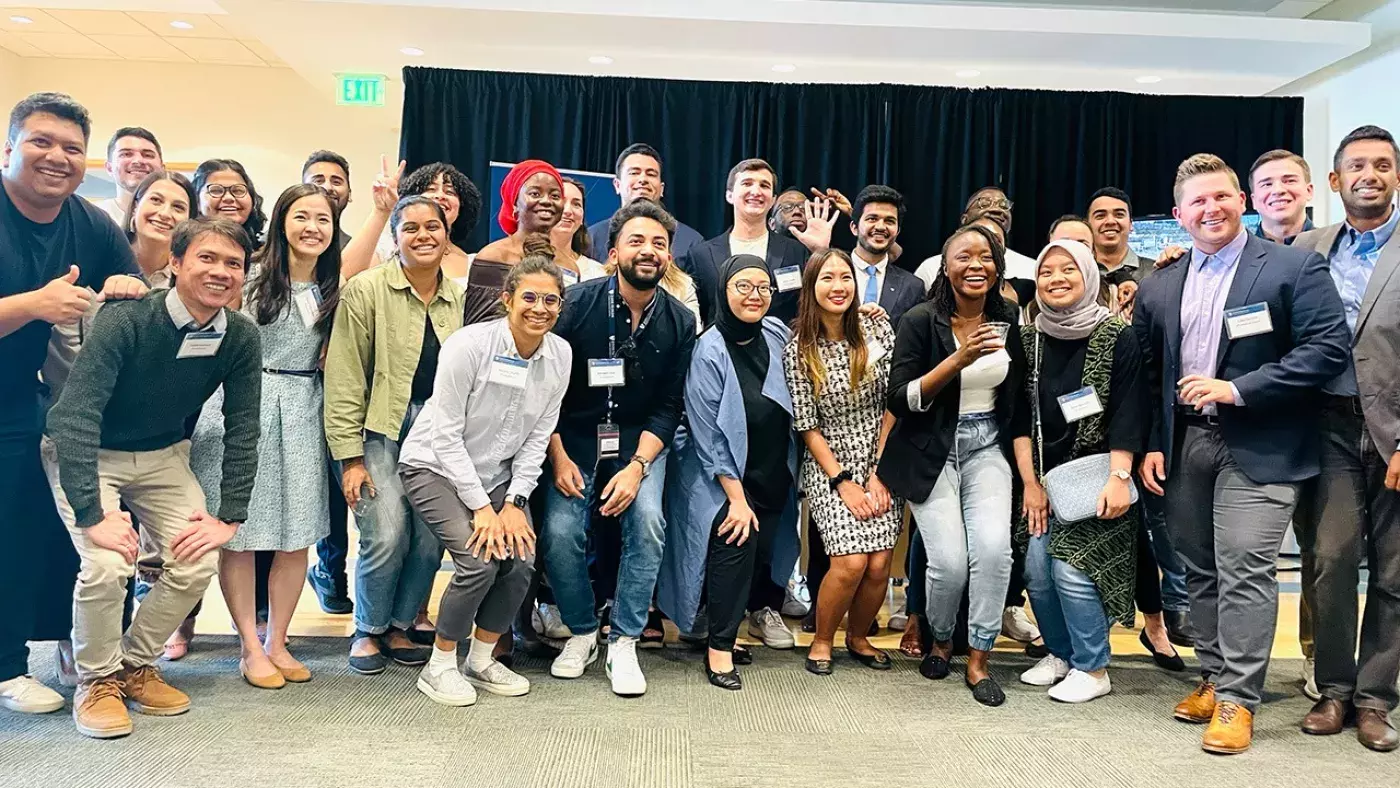
Student Experience
Pitch your ideas, put your business skills to the test, and compete in a case competition
Participating in a business-related case competition is one of the best ways to develop critical business and presentation skills, gain practical, real-world industry experience, and network with experts and potential employers. Collaborate with Carey faculty to sharpen your presentation and case analysis skills, then put them to the test by presenting to top executives from around the globe. With competitions hosted on campus and funding available for registration and travel to premier events, Carey Business School gives you the opportunity to compete—and win—on some of the world’s most prestigious case competition stages.
Interested in becoming a corporate sponsor of a case competition at Johns Hopkins Carey Business School?
Case competitions Carey participates in
AstraZeneca Case Competition
Global science-led biopharmaceutical leader AstraZeneca sponsors the annual national case competition hosted by the Carey Business School. Student teams from universities across the nation travel to Baltimore to compete for three top prizes on a case judged by a panel of AstraZeneca subject experts and business leaders.
CFA Institute Research Challenge
The annual CFA Institute Research Challenge is a global competition requiring students to research and analyze a publicly traded company, write a report, and present their buy, sell, or hold recommendations to a panel of industry experts. Teams are judged based on their research, analytical, valuation, report writing, and presentation skills.
Data4Good
The Data4Good Case Competition is a prestigious national event that convenes top undergraduate and graduate students to solve real-world social impact problems using data analytics, artificial intelligence (AI), and strategic communication. With $40,000 in prizes, wide institutional participation, and growing national attention, the competition serves as a high-impact experiential learning platform for students committed to applying analytics for the public good.
Graduate Consulting Club Case Competition
The annual Johns Hopkins Graduate Consulting Club Case Competition brings together students and fellows from across the country to work on some of the most pressing challenges in today's health care sector. Interdisciplinary teams comprised of students from across multiple schools, programs, and departments.
MIT Sloan Operations Simulation Competition
This intense, 48-hour simulated competition requires teams to improve the efficiency of a hypothetical near-bankrupt firm. Graduate students from top business schools across the globe aim to run the most profitable factory with rankings based on their ending cash balances.
Venture Capital Investment Competition
In this annual competition, student teams play the role of venture capitalists who are looking to invest in one of the startups presenting at the event. Student teams are assessed on the investment opportunities and on pitching an investment strategy to the judges. The winning team of the local (Carey students only) competition wins a spot in the regionals.
2025
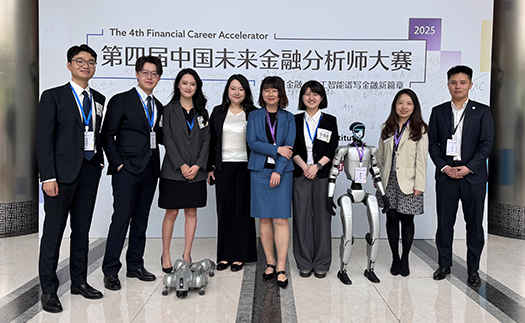
CFA Financial Career Accelerator
A team of Carey finance students won first place at the 2025 CFA Financial Career Accelerator in China. Competing under the theme “Intelligence Unleashed: AI Charts a New Chapter for Finance,” the team developed an in-depth report on the current and future applications of AI in finance.
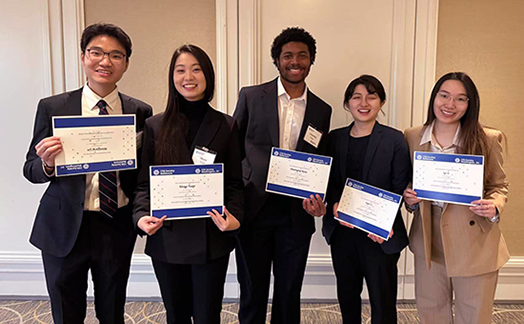
CFA Institute Research Challenge
Five Carey students took home first place at the Washington, D.C.-Baltimore area CFA Institute Research Challenge in February 2025, advancing to the sub-regional round of the global competition. This achievement marks Carey’s sixth win in the last eight competitions in which they had a competing team.
2024
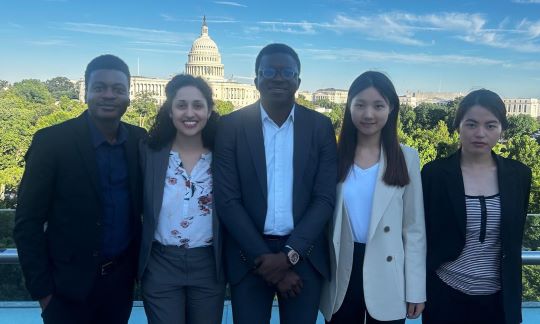
2024 iOme Challenge
A team of four first-year MBA students and two MS in Finance students won the 2024 iOme Challenge. The iOme Challenge is a prestigious national student competition that tasks participants with analyzing the current state of retirement policy in the United States and proposing viable policy solutions to address the needs of their generation. Participating teams respond to the annual iOme Challenge question with an essay and public policy proposal. The six Carey students wrote their response paper titled, “Investing in Our Future: A Transition to Sustainable Retirement Security.”
2024 Venture Capital Investment Competition
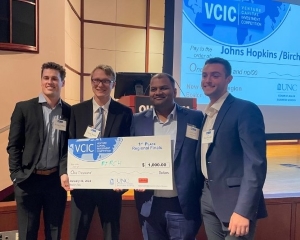
A team of four Carey students won first place at the 2024 New England Regional Finals of the Venture Capital Investment Competition in Boston. This marks the first win in Carey history at the regional round of the competition. The VCIC is a competition where teams of participants act as venture capitalists for the day and evaluate startups for potential funding. The teams conduct extensive research, draft a term sheet for their selected startup, and present findings to a panel of professional venture capitalist judges.
2023
Howard University’s 27th Annual MBA Exclusive Conference: 18th Annual Minority Case Competition
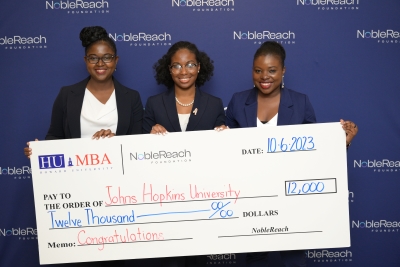
A team of Carey students took home first place and $12,000 at the 18th Annual Minority Case Competition, held during the MBA Exclusive Conference at Howard University. This year’s competition was sponsored by the NobleReach Foundation and themed “Leveraging Innovation and Entrepreneurship for National Competitiveness.” The case focused on the United States’ response to substantial adversarial investments in digital infrastructure and the need to create a mission-driven entrepreneurial ecosystem to remain competitive. The Carey team developed a comprehensive strategy to build the ecosystem, aligning entrepreneurs, investors, universities, students, communities, and government agencies. The strategy aimed to ignite a wave of innovation that would transform the entrepreneurial landscape, ultimately contributing to a more sustainable and responsible society. Students had a week to plan, strategize, and solve the case to then present their ideas to a panel of judges.
2022
BioNJ Health Equity in Clinical Trials MBA Business Plan Case Competition
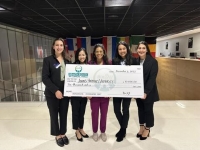
A team of Johns Hopkins Carey Business School students took home the first-place prize, winning $10,000, at the BioNJ’s inaugural MBA Business Plan Case Competition. The Carey team, consisting of five MBA/MPH students, developed a business plan that outlined a new health equity solution in clinical trials. The competition is designed to promote next-generation innovators and to identify new methods and models to strengthen clinical trial diversity and expand health equity.
MIT Sloan Operations Simulation Competition

A team of Carey students took first place, winning $2,000, at the 18th annual MIT Sloan Operations Simulation Competition, held virtually on April 20-22, 2022. This marks the third win by a Carey team in the last four competitions, making Johns Hopkins the best-performing business school (tied with MIT Sloan) in competition history.
CFA Institute Research Challenge
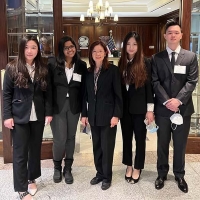
A Carey student team placed first in the annual local DC/Baltimore CFA Institute Research Challenge. The competition requires students to research and analyze a publicly traded company, write a report, and present a buy, sell, or hold recommendation to a panel of industry experts.
Case Competitions Funding and Support
Carey Business School provides case competition teams with faculty and peer advisors, case preparation workshops, a database of current national case competitions, and funding for registration, and other needs if necessary.
To request case competition resources, email Carey_Partnerships@jh.edu
Past case competitions
2021
Danaher Case Competition
Carey students placed second in the 2021 virtual Danaher Case Competition. This competition focused on the rapid growth of at-home lab testing and issues related to effectiveness, efficiency, and inequities in access.
KeyBank Ohio State University Minority MBA case competition
A Carey Business School team took first place, winning $10,000, in the KeyBank Ohio State University Minority MBA Case Competition.
Arthur Page Society - Student Case Competition
Carey student, Rhianna Taniguchi, placed first in the business school category with her submission, "Turning a Moment into a Movement: Why the NBA said 'Black Lives Matter.'"
UNC/Duke Case Competition
Carey students placed third in the UNC/Duke Case Competition. The competition brings together graduate students (Master’s, PhD, JD, MD) and provides the opportunity for teams to apply their analytical skills and creativity in a real-world context, by solving a real-world business problem.
2020
MIT Operations Simulation Competition
For the second consecutive year, a Johns Hopkins University Carey Business School student team took the top prize at the annual MIT Sloan Operations Simulation Competition.
Amazon Case Competition
The Carey Business School team took the top spot at the 2020 Reaching Out MBA conference— the largest gathering of LBGTQ+ business students and alumni.
Harvard Global Case Competition
A team of Johns Hopkins students placed third in Harvard University’s annual Global Case Competition on April 25, 2020. The team, which included four Carey students, team faced off against 160 other teams from around the world.
2019
Kellogg Biotech and Healthcare Case Competition
A four-member team of Johns Hopkins University students, including two from the Carey Business School, has won first place in the 16th annual Kellogg Biotech and Healthcare Case Competition.
MIT Operations Simulation Competition
A Johns Hopkins Carey Business School Global MBA team took top prize in the 15th annual MIT Sloan Operations Simulation Competition, held April 7, 2019, in Cambridge, Massachusetts.
More Listening, Less ‘Mansplaining’ Make Men Better Allies to Women Co-Workers
Active military and veteran students
Active military and veteran students
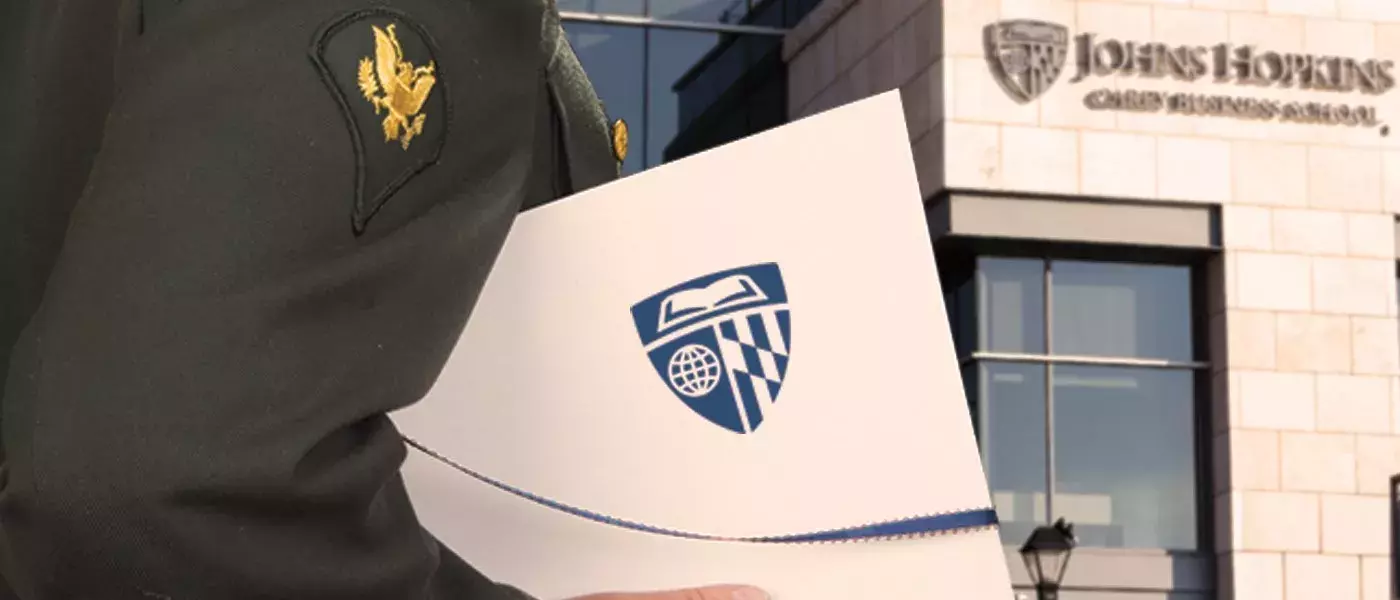
Student Experience
VET Academy
Johns Hopkins is proud to support our nation’s military by providing a premier business education during and after service.
At Carey, we deeply appreciate the sacrifices made by members of the armed forces. We proudly provide special support for former and active military members seeking to transition to business school.
The veterans support team at Carey brings together resources for students who are active-duty service members, veterans, reservists, guard members, and family members who intend to use Veterans Affairs education benefits.

Andrew Sanchez is a full-time MBA candidate at Johns Hopkins Carey Business School and a former U.S. Navy Nuclear Submarine Officer with over eight years of leadership and operational experience. He has worked on strategic projects in biotech and consulting and is passionate about leveraging business to drive innovation in healthcare and technology. Andrew currently serves as President of the Student Veterans of America chapter at Carey, where he supports veteran students through mentorship, community-building, and professional development initiatives.
Andrew Sanchez (MBA candidate)
Types of assistance at Carey
-
Carey Business School proudly participates in the Yellow Ribbon Program. The Yellow Ribbon Program is a voluntary agreement between Carey and the Department of Veterans Affairs to waive a portion of tuition costs that exceed the national maximum Post 9/11 GI Bill® reimbursement. The Veterans Administration will match the amount of the waiver provided by Carey and contribute that to your tuition.
Carey Business School offers unlimited annual benefits through the Yellow Ribbon Program, with no cap on the number of recipients or the amount of support provided. This ensures that all qualifying veterans receive maximum financial assistance. Please visit the Department of Veteran Affairs for full eligibility guidelines.
-
Through the Post-9/11 GI Bill®, Veterans Affairs will pay a percentage of a student's net cost for tuition and fees (after the application of any other tuition-specific support) to Carey Business School and disburse any eligible housing and book payments directly to students. The amount of payment is governed by the student’s eligibility as established by the VA.
Please visit the Office of Student Enrollment and Account Management’s website to learn more about the Post-9/11 GI Bill®.
-
As a thank you for your service, the $100 nonrefundable application fee is waived for all active duty and veteran applicants. To request the waiver, please contact the admissions recruiter for the program you are applying to before submitting your application.
-
Johns Hopkins regularly updates the types of assistance available to active military and veteran students. Stipends, additional military tuition assistance, and MD National Guard opportunities are available for Carey students. External military scholarships are also available through various external organizations, offering scholarships, grants, and loans. Details on each additional type of assistance can be found on the Johns Hopkins Office of Student Enrollment and Account Management’s Veterans Affairs website.
Veteran Buddy System: *lead buddy - Carey Buddy System - Lead Buddy Application
*new student/mentee – COMING SOON
Upcoming Events
Navigating Your Transition: Military to MBA/MS Success at Johns Hopkins
Tuesday, October 21, 2025 at 6:00 PM until 7:00 PM
Carey on the road and coffee chats
Carey's Admissions team is constantly traveling across the country–and the globe–to visit our prospective students. Join members of the admissions team on the road or over coffee to learn more about your options as an active-duty military or veteran student at Carey. Be sure to check this webpage regularly–Carey's Admissions team might be coming to a location near you!
VET Academy
Carey Business School’s Executive Education offers an innovative program designed to prepare senior military leaders for high-impact civilian careers. VET Academy bridges the gap between military leadership and the corporate world, equipping participants with the skills, knowledge, and networks to thrive as executives in top-tier organizations. The program focuses on unlocking the full potential of military leaders, empowering them to drive results, lead innovation, and shape the future of their organizations.
Networking opportunities for military students
Carey student veteran network
Student Veterans of America is a student-led organization that provides military and veteran students the opportunity for networking, career development, transitional assistance, adventure trips, and service opportunities. The student veteran network collaborates with various community and educational organizations in Baltimore and the Washington, D.C. area including FourBlock, 6th Branch, the Mission Continues, and Team River Runner.
Contact Carey.Students@jhu.edu for more information for more information or join the JHU Veterans Connection Group on LinkedIn to connect with other veterans at JHU.
Veteran alumni
Join the Johns Hopkins Veterans Affinity Network to stay in touch with veteran alumni across all Johns Hopkins schools and programs. Learn more about our veterans affinity network.
Carey Veterans Buddy System
Carey Veterans Buddy System
The Carey Veteran Buddy System pairs incoming and current students to help you navigate this new terrain. They will hold online social and professional events, in-person leadership programming in honor of Veteran’s Day, and support connecting students to many resources, networks, and programming in the Hopkins community.
- Interested students should contact Andrew Sanchez
Carey Vet LinkedIn photos
Army veteran Tyson Patrick (MBA ’21) was able to embrace the Carey community before taking classes in the full-time MBA program. Hear more about the support he received from Carey as he transitioned from the military to an MBA and how he is now leveraging his strong connections to grow his network.
Getting started
New students
For important details regarding VA Education Benefits, please visit JHU’s Veteran Affairs website. For the quickest response, please submit all questions or submission of eligibility status to JHU’s Veteran Benefits Inquiry.
Current students
Students are certified on a per-semester basis, meaning benefits do not automatically roll over from one semester to another. Students must complete the Third-Party Payer agreement each semester in order to request certification. The agreement can be found on the billing tab in your SIS account. Please select VA and the Chapter that you are using for that particular semester. For example, VA Chapter 33. Next, read the student acknowledgment section, check the box to acknowledge, sign, and submit.
Students utilizing VA education benefits must immediately let their school certifying official know of any change in their enrollment status or program that might affect the amount of their payment from the VA. Submit your information to JHU’s Veteran Benefits Inquiry.
Questions? Please reach out to us.

Jennifer Lampton
Assistant Director of Admissions
Admissions
Johns Hopkins Carey Business School
Office: 410-855-4122
jlampton@jhu.edu
Schedule a Meeting at: https://go.oncehub.com/JenniferLampton

Roger Williams
Director
Diversity, Equity, Inclusion and Belonging
Community and Corporate Partnerships
Student Resources
Office of Student Affairs
Johns Hopkins Carey Business School
Office: 410.234.9277
r.williams@jhu.edu
For benefit-specific questions, please submit a veteran inquiry here to connect with a team member.
Flexible MBA Specializations
Flexible MBA Specializations

Related pages
Johns Hopkins Carey Business School’s Flexible MBA program offers eight MBA specializations for you to choose from. An MBA specialization can be beneficial in preparing you with a deeper understanding of a specific industry to support your career goals. Customize your learning experience in one of the eight specializations listed below.
Specializations
-
Specialize in artificial intelligence for business
The Artificial Intelligence for Business specialization empowers students to lead in a fast-changing environment. It offers a comprehensive learning experience that blends AI's technical foundations with real-world business applications and strategies, including a focus on responsible AI and human-AI collaboration. By mastering these critical areas, graduates will be equipped to drive transformative solutions that not only optimize business processes but also uphold ethical standards, ensure effective governance, and enhance human capacities in an increasingly AI-driven world.
-
Specialize in business analytics and risk management
The Business Analytics and Risk Management MBA specialization includes quantitative courses that focus on business decisions and applications. Learn the essentials of data analysis, spreadsheet models, and risk assessment to harness data and navigate uncertainty with confidence.
-
Specialize in entrepreneurship
The Entrepreneurship MBA specialization is designed to teach the methods, processes, challenges, and success factors in innovating and creating new products, enterprises, and services. These courses help to develop creative skills that can also apply directly back to your current organization.
-
Specialize in finance
The Finance specialization within our Flex MBA program is designed to equip students with a deep understanding of financial principles and advanced analytical skills, essential for navigating today’s dynamic financial landscape. Whether students aim to master portfolio management, explore global financial markets, or develop expertise in risk management, this specialization offers a comprehensive curriculum to prepare them for successful careers in finance.
-
Specialize in health care management
Harness the resources and reputation of the Johns Hopkins network and expose yourself to the experts, knowledge, and practices available at a world-leading medical school and health innovator. Prepare to stay ahead of the curve and become a leader in health care with the Health Care Management MBA specialization.
-
Specialize in leadership
Regardless of industry or function, effective leadership is critical to driving high performance, innovation and financial success. Build your skills to inspire others, coordinate teams, and develop and leverage the full capacity of the people around you.
-
Specialize in marketing
The Marketing specialization is designed to meet the demands of professionals in the changing field of marketing. The curriculum provides students with a strong foundation in marketing knowledge as well as skills in analytics. Most courses have a strong “hands on” component with in-class examples and group projects. Students are supplied with cutting-edge marketing techniques to identify, understand, and cultivate relationships with customers in the digital environment.
-
Specialize in real estate
Taught by real estate and infrastructure practitioners, including industry titans from the Carey Business School’s real estate advisory board, the Flex MBA Real Estate specialization is curated to convey a broad and current understanding of how real estate and infrastructure deals are sourced and financed. Students will be equipped with skills such as modelling and proforma development, feasibility analysis, risk mitigation, leadership, and entrepreneurship, and an understanding of zoning and land use policy.
Featured News

business of health
Johns Hopkins receives $1.6 million NIH grant to commercialize innovations to treat substance use disorders
admissions
Financing Your Online MBA
career outcomes
Carey alum and CEO of ITegrity wins Maryland’s Small Business Person of the Year
business of health
Johns Hopkins receives $1.6 million NIH grant to commercialize innovations to treat substance use disorders
admissions
Financing Your Online MBA
career outcomes
Carey alum and CEO of ITegrity wins Maryland’s Small Business Person of the Year